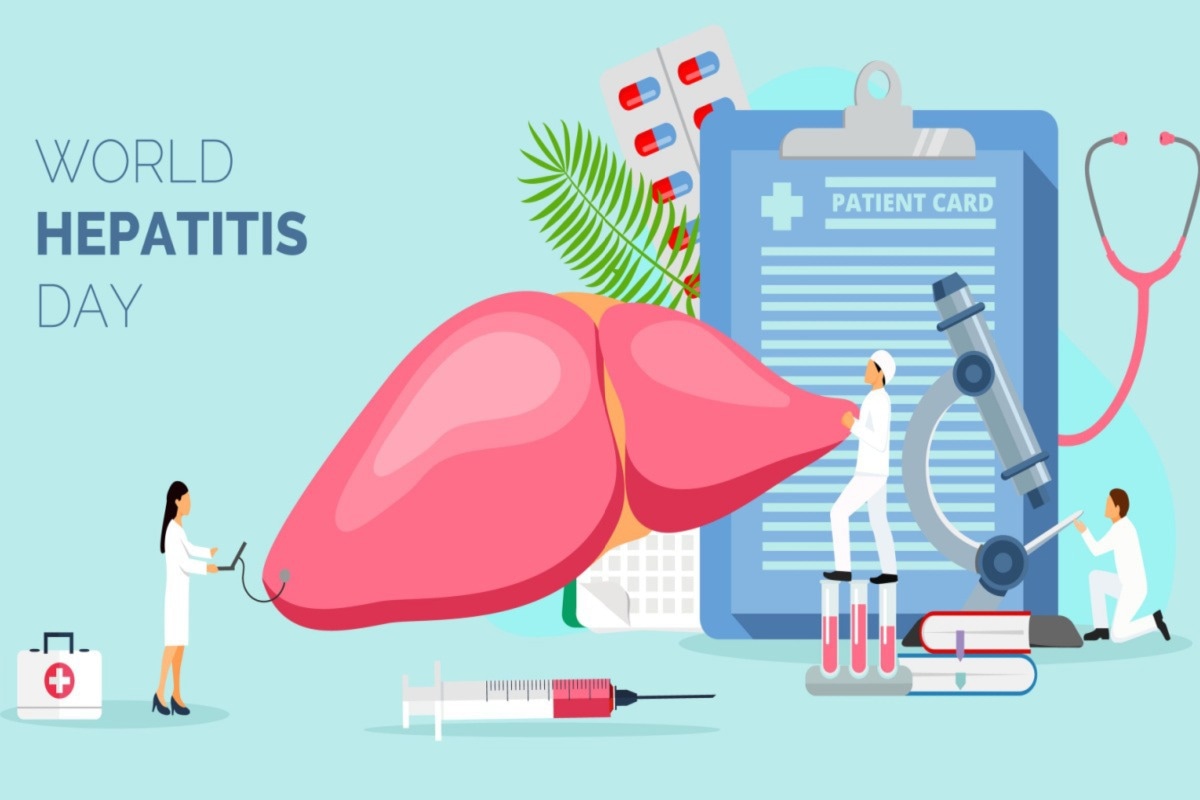[ad_1]
Please can you introduce yourself and tell us about your background as an infectious disease specialist?
Hi there, my name is Simon Parker. I am a senior market manager for Roche Diagnostics. My background is in Virology from when I started work as a Biomedical Scientist at Great Ormond Street Hospital. I transitioned to research and studied for a PhD developing antibody tests for use with dried blood spot samples.
In academia, I have worked on some interesting viruses along the way, including hepatitis C, chickenpox (Varicella Zoster) – the cause of shingles – rabies, and a whole group of gastro viruses. Having hung up my lab coat, I now work with Roche towards the commercialization and management of our immunochemistry portfolio.

According to the World Health Organization (WHO), in 2019 there were an estimated 296 million people worldwide living with hepatitis B and 58 million people worldwide living with hepatitis C. Can you tell us more about the different types of hepatitis infections and how they affect the body?
Hepatitis B is a potentially life-threatening liver infection caused by the hepatitis B virus (HBV). It can cause chronic infection and puts people at high risk of death from cirrhosis and liver cancer. Infection is largely asymptomatic in children but occasionally and in adults, acute illness is observed with symptoms that last several weeks, including yellowing of the skin and eyes (jaundice), dark urine, extreme fatigue, nausea, vomiting and abdominal pain.
Hepatitis C (HCV) can cause both acute and chronic hepatitis, ranging in severity from a mild illness to a serious, lifelong illness, including liver cirrhosis and cancer. Symptoms are quite nondescript, from flu-like (eg. muscle aches and a fever) to feeling tired all the time, loss of appetite, stomachache, feeling and being sick. Around 30% (15–45%) of infected persons resolve infection within six months without any treatment. The remaining 70% (55–85%) of persons will develop chronic HCV infection. Of those with chronic HCV infection, the risk of cirrhosis ranges from 15% to 30% within 20 years.
We need to be aware there are other causes of infectious hepatitis for healthcare and for differential diagnosis. The most important are hepatitis A (HAV) hepatitis D (HDV) and hepatitis E (HEV). HAV (food and food preparation) and HEV (water, under prepared pork and blood donations) are spread via the fecal oral route and are important global problems. HDV is highly associated with HBV, needing it to replicate, and co-infection is considered the most severe form of chronic viral hepatitis due to more rapid progression towards liver-related death and hepatocellular carcinoma.
 Image Credit: 777 Bond vector/Shutterstock
Image Credit: 777 Bond vector/Shutterstock
How are the different types of viral hepatitis spread, and how are they currently being treated?
HBV is spread through blood, semen, and vaginal fluids. Ways it can be spread include having sex without a condom, sharing needles, and the use of unsterilized needles for tattooing. HBV infection is possible through infected blood or organ donation. HBV is transmissible from mother to baby during pregnancy or birth hence HBV testing is included in antenatal screening programs. The younger a person is when they are first infected, the greater the risk of developing chronic hepatitis B. HCV is most often spread through blood-to-blood contact by the sharing of unsterilized needles used to inject recreational drugs, and sharing razors or toothbrushes. Transmission is also possible from a pregnant woman to her unborn baby and occasionally through unprotected sex. HDV needs HBV to replicate, so spreads via the same route.
HCV treatment remains a big success story. Direct-acting antivirals have proven highly effective in curing HCV in more than 90% of people. Acute HBV can resolve on its own. Chronic HBV treatment is possible in some patients, but the diagnosis is pivotal. Chronic hepatitis B infection can be treated with medicines, including lifelong oral antiviral agents. Treatment can slow the progression of cirrhosis, reduce the incidence of liver cancer and improve long-term survival. In 2021 the WHO estimated that 12% to 25% of people with chronic hepatitis B infection will require treatment, depending on the setting and eligibility criteria.
The theme of World Hepatitis Day for 2022 is “I can’t wait” (World Hepatitis Alliance) and aims to accelerate the fight against viral hepatitis. Why is it so important that we accelerate the global fight against hepatitis?
Scientists understand that there is an ever-increasing population of undiagnosed chronic hepatitis HBV and HCV patients at risk of long-term complications such as cirrhosis and cancer, which will present a huge burden to the healthcare sector. Most people with chronic hepatitis B remain symptom-free (silent) for 20 or 30 years. Likewise, HCV symptoms can often be put down to other illnesses such as depression, fatigue, skin problems, insomnia, pain, and digestive disorders, so it too can persist undetected for a long time. For these reasons, hepatitis C is often referred to as the ‘Silent Epidemic.’ Therefore, it is vital to identify infection in patients as early as possible by the screening of blood samples or correct diagnosis to avoid the severe complications and complexity of treatment later. For HCV, the good news is that these medicines now exist that can cure the infection in nearly all cases, which means that it can be eliminated.
What does the campaign theme of “I can’t wait” mean to you personally?
It’s all about how we can use the right diagnostic tests – those that are highly sensitive and specific – to correctly differentiate patients with a past infection (so we can think about their future health burden) and those with an active infection (so we can treat symptoms, monitor the course of infection and hopefully cure). It is important to know the type of infectious hepatitis to prevent its spread and treat it appropriately. In particular, plans for eliminating HBV and HCV can only happen by identifying infected people who might not know they are infected and show few or no symptoms.
 Image Credit: Corona Borealis Studio/Shutterstock
Image Credit: Corona Borealis Studio/Shutterstock
Can you tell us more about hepatitis testing and how the infections are diagnosed?
It is very important not just to correctly diagnose hepatitis but to identify the correct type of infectious hepatitis for the benefit of the patient and society. There are four common routes to differential diagnosis. Biochemical tests are important to identify unusual levels of proteins in the blood that might imply abnormal liver function, but the first line of attack is often immunodiagnostic. That is the identification of the infectious agent by detecting parts of the virus in the blood.
Sometimes we can identify antibodies produced early in infection that help in the diagnosis of acute infection. It is important to understand what the virus is doing in the body once we have implicated it as a cause of hepatitis. Looking for the presence of virus in the blood is best carried out using molecular tests (for example qualitative or quantitative polymerase chain reaction [PCR]). These tests can tell us if the patient simply has a past exposure to the virus or has an active virus replicating within them. Tissue diagnostics can then help identify cellular damage to liver tissue and prognostic information on the extent of the disease.
These tests are often carried out on samples sent to hospital pathology laboratories that have highly automated instruments at their disposal. Some molecular tests are available at the point of care and hence can be used outside of the hospital setting. This is very important, for example, with patients at high risk of HCV infection who are hard to reach and follow up with for treatment and cure.
Why is viral hepatitis testing a vital contributor to the World Hepatitis Day 2022 theme of “I can’t wait”?
Viral hepatitis testing is in a great place with both laboratory and point-of-care tests automated, sensitive, specific and cost-effective. In the absence of symptoms, an effective diagnostic test is the best way to diagnose infectious hepatitis and contribute to the WHO goals of elimination. The COVID-19 pandemic has shown the importance of diagnosis in controlling the spread of infection. Early diagnosis of HCV and HBV, in particular, can protect hospitals from the consequences of providing long-term, complicated care to patients with cirrhosis and cancer.
Moreover, antivirals are hugely important in curing HCV and in the control of some HBV infections. The challenge is getting the tests to the patients, putting together a cost-effective program to help identify and treat patients, and ensuring patients are aware of the possibility of HCV re-infection. Why would anyone wait?
Looking forward, how do you imagine the future of hepatitis prevention, testing, and treatment to evolve over the next ten years?
HBV vaccination has been shown to be incredibly successful. In the UK, the hepatitis B vaccine is offered to babies as part of the 6-in-1 vaccine. I look forward to seeing the success of this program in the years to come. Hepatitis B specific Immunoglobulin (HBIG) is an important post-exposure treatment for suspected transmission and can contribute to prevention. Increasing awareness of sexual transmission via drug misuse and poor hygiene will always have a steady impact on the decline and must continue to be resourced. The biggest impact I would see would be in examples such as HCV elimination programs where health networks are coming together with charities and the pharmaceutical industry to drive forward HCV diagnosis to identify HCV infected individuals through targeted screening of high-risk groups and offer treatment.
What is next for you? Are you hopeful that we can soon reach global viral hepatitis elimination goals in countries around the world?
According to the WHO, 354 million people globally live with a hepatitis B or C infection and almost 90% of people with viral hepatitis are unaware that they have it. The WHO global hepatitis strategy’s ambitious aim was to reduce new hepatitis infections by 90% and deaths by 65% between 2016 and 2030. However, most countries failed interim targets in 2020 and few countries in the world are on track to achieve the WHO target of eliminating viral hepatitis by 2030.
With this in mind, a new Global Health Sector Strategies has been approved that includes HIV, viral hepatitis and sexually transmitted infections for the period 2022-2030. This includes five strategies toward a common vision to end epidemics and advance universal health coverage, primary healthcare, and health security in a world where all people have access to high-quality, evidence-based, and people-centric health services.
 Image Credit: Explode/Shutterstock
Image Credit: Explode/Shutterstock
Where can our readers find more information?
About Simon Parker
Simon has more than 30 years’ experience working in the field of infectious diseases. He is a Fellow of the Institute of Biomedical Science, holds a PhD in Medicine from University College London and has published articles on a range of subjects, including respiratory, gastro and blood-borne viruses.
blood-borne viruses.
Simon’s background is in Virology, working in the NHS, Universities and the National Institute of Biological Standards and Controls across pathology, R&D and manufacturing. He now works for Roche Diagnostics UK Ltd as a Senior Market Manager and has been heavily involved in the rollout of the Roche diagnostic portfolio for COVID-19.
[ad_2]
Source_ link














